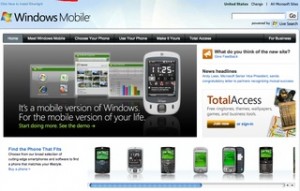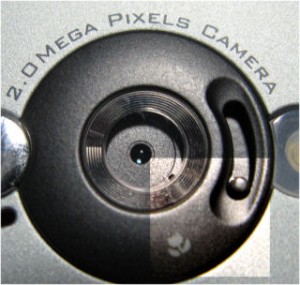
The Silverlight powered version of Microsoft’s WindowsMobile.com went live. But, in the process, it looks like a lot of links were broken. Jason Dunn, Tyson Greer, and I wrote a bunch of Windows Mobile 6 articles for Microsoft.com last year. All of these articles are still valid and apply to Windows Mobile 6.1 devices. If you search for any of our names, you will see links to these articles. But, all the links are broken. Too bad, there is a lot of good information for Windows Mobile device users that disappeared with these links.
Category: Windows Mobile
Microsoft Windows Mobile Pocket PC, Pocket PC Phone Edition, and Smartphone
-
Silverlight Powered WindowsMobile.com Goes Live and Breaks Articles Links
-
If Google Gets Contacts Right, Watch Out!
For years Palm OS users rightly criticized that Windows Mobile for needing far too many taps and scrolling to enter the simplest calendar event or contact information. Although it looks like Palm OS will join the ranks of Wordstar, Lotus 1-2-3, and CP/M soon, the criticism is still valid. It is still a giant pain to enter contact information in Windows Mobile. And, don’t get me started on the effort needed to enter simple calendar event information that falls outside of the rigid structure of the Windows Mobile calendar. For example, let’s say you arrive somewhere at 4:34 pm and need to come back 1 hour later to feed the parking meter some coins. Count the number of steps to set that event. Yes, there are third party apps that you can add to your WiMo device. But, still, this is stuff that should be easy to do right out of the box.
If you want to get some people riled out, ask about setting calendar events for multiple time zones. For example, a person who lives in California sets a couple of local appointments for this week, a couple of appointments in New York the next, and Germany the week after that. It can get messy real fast unless you pay extreme attention to what you are doing with each appointment.
One of the things I’ve found myself doing for the past year is entering appointments and other calendar events in Google Calendar first because it is so much faster to type 2pm Attend meeting XYZ than enter something on my Smartphone or Pocket PC. Of course, I am usually at a full size keyboard when using Google Calender, so that is a huge bias. I haven’t looked how Google Android handles calendar and contacts entries. But, if it half as easy as Google Calendar, Windows Mobile is going to have a huge problem on its hands.
Microsoft needs to do two things. First, it needs to fix its Windows Live Calendar with its 20th century event entry form. Once it fixes it, it needs to be able to sync over the air with Windows Mobile devices.
-
Want to Try out the QIK Streaming Software? I Have 500 Invitations
Have a Samsung or Motorola Windows Mobile phone and want to try out the QIK streaming video service? I have 500 invitations to give away. Here’s how to get one. Check the QIK phone compatibility list before asking for an invitation though…
QIK sign-up and compatible phone list
After you sign-up at the link above, send an e-mail to mobileviews(at-sign)qik.com. Type in the same phone number you used during the web sign-up process in the subject line. QIK will send an SMS message to your phone with the download link after you approved.
-
My Pocket PC Camera Has Macro Setting?

I think I noticed the macro switch on my TyTn Pocket PC Phone Edition (aka Professional Edition) when I got it last year. But, I never tested it out until this week. While the TyTn’s digital camera is better than most Windows Mobile device cameras I’ve tried, it is still hampered by a cheap lens. And, the macro feature suffers because of this. The macro photo of the leaf looks relatively sharp here because it is a resized down from the original 2 megapixel image. The original image looks quite blurry.Still, it is a nice feature to have. I’ll play around a bit more with distance, lighting, etc. to see if I can figure out optimized techniques for its use.

-
Windows Mobile and Google Android: Who Is the Customer?
Yesterday I said that Windows Mobile’s real competitor is Google Android. WiMo has already conceded defeat to Apple’s iPhone in the consumer space. Why? How? You and I, as individual consumers, have not been the target Windows Mobile customer since 2003. As soon as Microsoft’s marketing became phone-centric, the target customers became enterprises running Exchange Server and the mobile phone carriers. Microsoft’s recent purchase of Danger (the firm that sells the youth-consumer-centric Sidekick phone) muddies the picture even more. How are Windows Mobile and the Sidekick related? They sure don’t share the same operating system or run the same applications. They have completely different market focuses. This can only serve to confuse their marketing efforts going forward.
The big unanswered question is who is the market focus for the Google Android based phones? Unless it syncs with Exchange Server or Lotus Notes, it is not the enterprise (at least initially). Google’s multi-mode reference designs (touch and non-touch screen devices) may cause the same mind-share fragmentation that Windows Mobile’s touch and non-touch reference designs do. Given a variety of hardware vendors (again like Windows Mobile), it is hard to imagine that Google’s phone will directly compete or impact on iPhone sales. It will, however, have an advantage in the US by not being locked to a single mobile carrier (AT&T Wireless). My guess is that Google’s phone will take market share directly away from Windows Mobile and what is left of the Treo Palm OS based phones (are new Palm OS phones still around?). So, the follow-up question is: How much damage will the various Google Android phones cause to Windows Mobile smartphone sales? My guess is: A lot. If the Google-based phones are even half as easy to use as the iPhone, half-as compelling, and syncs reliably with the Google cloud services (calendar, contacts, mail, etc.), it will be a huge seller. Just imagine if Google adopts Apple’s Mac vs. PC ads and goes after ActiveSync/WMDC, the lack of media playlists, the slowness of going from app-to-app, and other WiMo weaknesses. It could get brutal in TV commercial-land.
-
iPhone vs. Blackberry & Android Vs. Windows Mobile
I’ve noticed some talk of comparing the upcoming phones based on Google’s Android platform to Apple’s iPhone. But, if you look at the platforms (literally and figuratively), the comparion doesn’t actually make any sense except in the fact that all these platforms will compete with each other.
Apple and RIM are more alike than Apple and Google. Both Apple and RIM control both the hardware and the software. Both own their respective market spaces at the moment: Apple iPhone = Consumer and RIM Blackberry = Business. And, both are trying to cross over into the other’s market territory.
Google Android is more like Microsoft Windows Mobile. Both are software reference platforms that rely on third party hardware manufacturers to deliver products to the market. Microsoft has no branding mind-presence in the market (no casual observer asks if you are using a Windows Mobile based phone). Google may find itself with the same problem. This may be ok if a single manufacturer (say HTC) hits a home run on the first swing and everyone identifies the “Google Phone” with that one device or brand. But, if Android phones are diffused in the market with lots of brands, form factors, and models, no one will care enough to ask if you are using a Google Android phone.
Google has one huge advantage though: It has no legacy products to worry about destroying. Microsoft has had to reduce the functionality of Windows CE/Mobile since day one to make sure it does not destroy the existing Windows 95/98/Me/NT/2000/XP/Vista market. It had to reduce the functions of Word, Excel, and PowerPoint Mobile to keep Microsoft Office at the top tier. Microsoft didn’t provide syncing to its Live/MSN cloud services (calendar, contacts, tasks) to protect Microsoft Outlook and Microsoft Exchange Server. Google doesn’t have this problem. They have just one platform: The Google Cloud.
Microsoft has to be willing to destroy itself in order to move forward in the mobile/cloud age. Couple of words/proper nouns to the wise: Pony Express, Western Union, DEC.